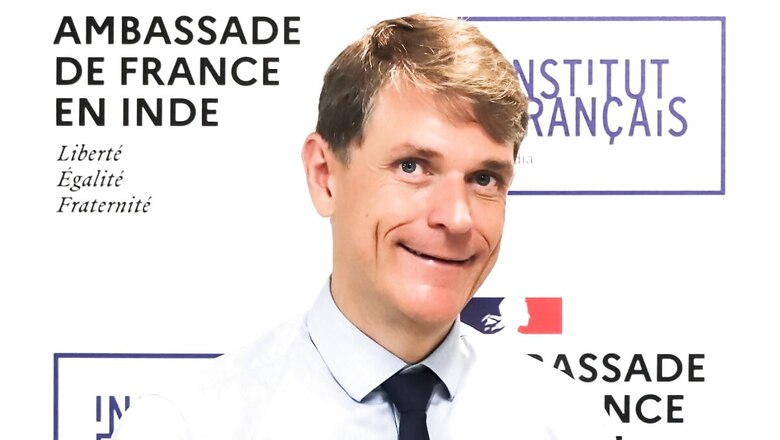
views
“A few years ago, there were only a handful of Indian students who went to France to continue their higher studies. But post-Covid, there has been a sudden increase in the number of students going to study there,” says Emmanuel Lebrun-Damiens, director of the French Institute in India and Counsellor at the French Embassy for Culture, Education and Science.
Lebrun-Damiens has also served as the Deputy Ambassador in New Zealand, negotiator at the United Nations in New York, and a Consul General in San Francisco. He also worked at the Ministry of Foreign Affairs in Paris as Head of the department in charge of health, education, and gender issues.
In an interview with News18, Lebrun-Damiens talks about India and France relations in the education sector, how France tackles illegal student migrants, challenges in Indian student visa applications, student exchange programmes, and much more.
Excerpts from the interview:
Q. India and France’s relations both in terms of geopolitics and in particular to the education sector have seen a steady increase. After 2030, how do you see the bilateral relations in the education sector?
A. First is student mobility which is a huge endeavour. The challenge is to diversify the programmes for Indian students and to make sure that they enjoy and benefit from the diversity offered by the students. As we increase the number of opportunities for Indian students we would like to see more diversification of the courses. That’s really the top of our priorities.
Q. Lately two Australian Universities Deakin and Wollongong have confirmed that their campuses will be set in Gujarat’s GIFT city. Is something on a similar line planned by France also?
A. There are partnerships between some Indian and French universities that provide joint programmes and dual degrees. This way, students both from India and France receive the same knowledge and get the benefits of dual degrees. We believe that these joint degrees are more pragmatic and flexible than establishing a university.
Q. France is eventually transforming into a one-stop destination for Indian students to study and even for employment purposes. What policies your government has adopted for Indian students that have attracted them?
A. The relations between the two countries were good as in the past as they are now. We want to develop people-to-people relationships and we consider the best way to do that is through student mobility. For the last 6-8 years, the top of our programmes has been in operation here. We are increasing specific programmes for India. We are adapting to the best care of Indian needs in France. When PM Modi went to France for Bastille Day, the message of the French Government was we would do everything so as to have 30,000 Indian students studying in France by the year 2030. Today when an Indian goes to a French University through scholarships, only 30 per cent of the cost is borne by a student, and 70 per cent is taken care of by French taxpayers.
Q. In 2020, it was decided that the number and quality of student exchanges would increase with an aim to reach 10,000. What has been the progress in this segment and is there any new target to increase student exchange?
A. Before the COVID-19 pandemic, we reached the target. Prior to the pandemic, some 9,000-10,000 Indian students went to France for higher studies. Several Indian students leave the host country and come to France for all types of courses like six months, or four years. We have thus perhaps already reached 10,000 to 20,000 Indian students in France. The next target is to reach 30,000 Indian students who are coming to French universities.
Q. Many French Universities have secured a place in the Shanghai Index Ranking 2023. Despite this, the number of Universities in QS University Ranking 2023 and in the World University Rankings are comparably less. How the country is working to improve its universities ranking especially on the parameters of employer reputation and citations per faculty.
A. 45 French institutions are ranked in the latest Times Higher Education World University Ranking, and 35 in the QS World University Ranking 2024. France has even moved up one place in this ranking compared with 2023, to 7th place in the world ranking of the best universities, behind the United States, Great Britain, Australia, China, Hong Kong, and South Korea.
If we look at the more thematic rankings, the results are even better. For example, France is very well placed in the rankings of ‘young universities’ (institutions that have been in existence for less than 50 years). One French institution, PSL, is in third place in the Times Higher Education ‘Young Universities’ 2023 ranking. Five French institutions feature in the top 20, including Institut Polytechnique de Paris (8th), Université Paris Cité (11th), Université Paris-Saclay (12th), and Sorbonne Université (15th).
Another example of French academic excellence is France’s dominance in management rankings. Since 2005, the Financial Times has published a ranking of the best Masters in Management (MiM). 24 French masters are singled out in the last MiM ranking, including 13 schools in the top 50, and four in the top 10: HEC Paris (2nd), followed by ESSEC (5th), ESCP (6th) and EMLyon Business School (9th).
Recognition of the excellence of French higher education is also reflected in the employability of its graduates. With 18 institutions ranked, including 11 in the top 100 of the “Global University Employability Ranking 2022” published by the Times Higher Education, France is in 2nd place worldwide after the United States… and ahead of Germany and the UK.
Q. Every year lakhs of Indian students visit the US and UK but compared to them, the number of students visiting France is much lower. What are the lacunas in this sphere and how is the French government working on it?
A. Student mobility to the United States or Great Britain is difficult to compare with student mobility to France for several reasons, which include the language barrier and the sizes of the Indian diaspora across these three countries (according to the Ministry of External Affairs, there are 4,460,000, 1,764,000, and 109,000 overseas Indians in the US, UK, and France respectively).
The French government has implemented multiple strategies to encourage young Indian students to consider France as a study destination. Without being exhaustive, these encompass a range of initiatives such as heavily subsidised tuition fees in public educational institutions, comprehensive support systems including housing assistance and social security, appealing scholarship programmes, the establishment of a wide array of programmes taught totally in English (more than 1,600 programmes), the introduction of international classes dedicated to assisting students opting for programmes in French, the establishment of numerous academic partnerships between French and Indian institutions (exceeding 600 to date), and a favourable policy on student employment both during their academic tenure and post-graduation.
Q. The process for the long-stay visa is quite cumbersome for the students. What is the embassy doing to simplify the selection procedure and reduce the time limit along with a smooth passage?
A. We make every effort to speed up the procedure. We have human resources and other means to speed up the process. My recommendation is to apply as soon as you can. Students leave in September for the university’s longer programme and for shorter courses throughout the year.
Q. Many students connect with agencies to submit their visa application leaving them paying a hefty sum of amount. In other cases, students are also duped. How accessible the selection procedure is for students?
A. If anyone wants to go to France, they do not need to connect with an agent. They can contact the Campus France and get help with all that an agent will do. An Indian student who wishes to study in France can contact Campus France. That’s the service we offer.
Q. Which courses have been more popular among Indian students and which are least opted by applicants?
A. A large number of Indian students study management and business in France. It is long majority of Indian students with 70-75 per cent of students opting for management courses. This tells us about the quality of our management courses. There is a lot of progression in the engineering schools and they are not expensive. A large majority of the tuition fees are taken care of by taxpayers for students with scholarships. Further, after completing a course, if a student wishes they can go for higher education and jobs as well. Earlier, the post-study work policy is for two years while students can obtain a 5-year Schengen visa. Both India and France are big countries of sciences and mathematics. The subjects play a huge role in the curriculum of France and India. We are creating a French Indian campus on life sciences for health between the universities of the two countries.
















Comments
0 comment